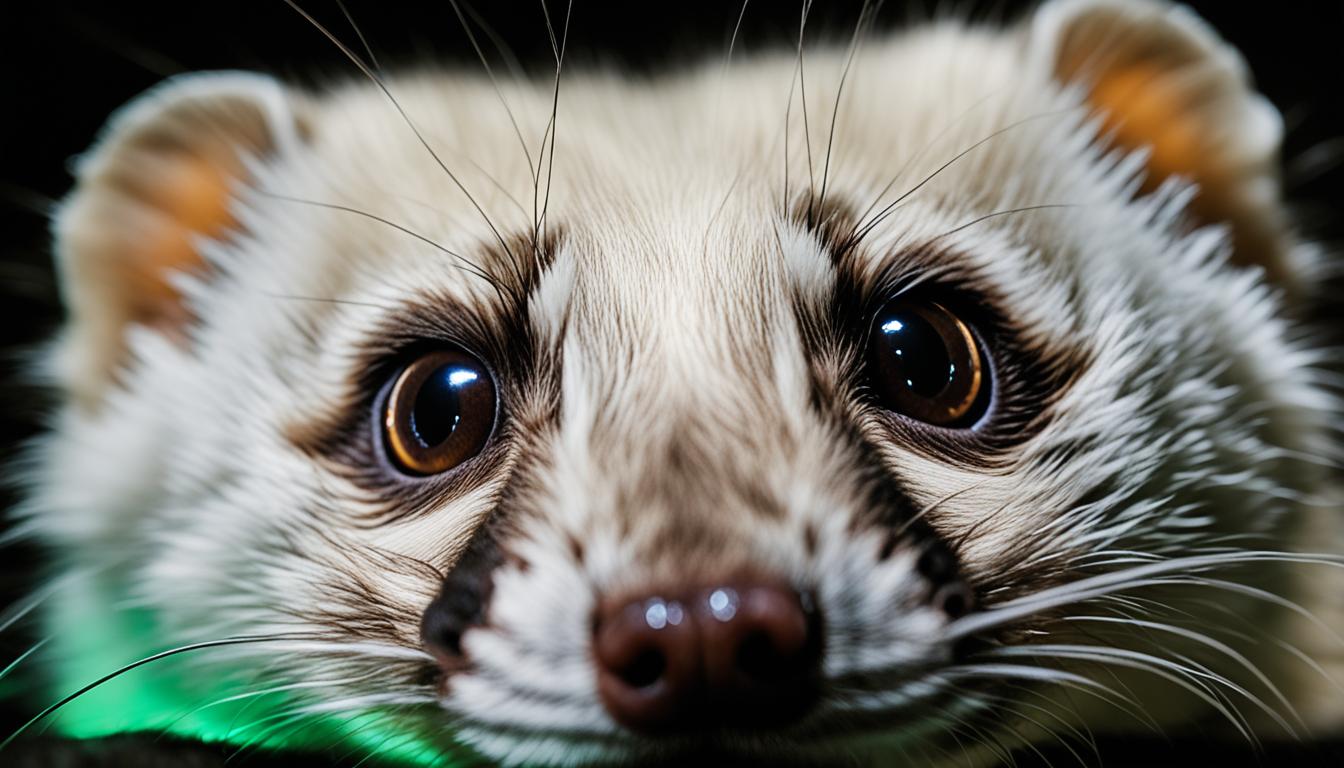Were you aware that ferrets, our cuddly and lively pals, have the capability to see in the dark? Although it might be unexpected, ferrets, similar to numerous other animals, have an impressive night vision that helps them move around in dim lighting. Their eyes are designed to maximize the little light present, allowing them to see things that are often invisible to us humans.
Unlike us, ferrets are equipped with a structure called the tapetum lucidum, which reflects light back through the retina and enhances their vision in dimly lit environments. This adaptation allows them to capture and process light particles more efficiently, providing them with a distinct advantage in the dark. Moreover, research suggests that ferrets, along with other mammals, are capable of perceiving ultraviolet (UV) light, which remains invisible to our eyes.
Understanding the intricacies of ferrets’ night vision and their ability to see in the dark sheds light on the fascinating world of animal perception. Join us as we delve into the details of their visual adaptations, explore the significance of ultraviolet vision, and uncover the implications of their extraordinary night vision capabilities.
Key Takeaways:
- Ferrets, like many other animals, possess the ability to see in the dark due to their specific visual adaptations.
- The tapetum lucidum, a reflective layer behind the retina, enhances ferrets’ vision in low light conditions.
- Research suggests that ferrets, along with other mammals, can see in ultraviolet light, which is invisible to the human eye.
- Understanding ferrets’ night vision can help ferret owners provide appropriate lighting conditions and engage in enriching activities.
- Nocturnal vision in the animal kingdom is a fascinating and diverse field of study.
Understanding Ferrets’ Night Vision
Ferrets possess several visual adaptations that contribute to their impressive night vision. One of these adaptations is the tapetum lucidum, a reflective layer located behind the retina.
This structure helps amplify any available light by reflecting it back through the retina, allowing the ferret’s eyes to capture more light particles and enhancing their vision in low light conditions. This adaptation is commonly found in nocturnal animals and contributes to their ability to navigate and hunt in the dark.
Let’s take a closer look at the tapetum lucidum and its role in the ferret’s low light vision:
| Visual Adaptation | Description |
|---|---|
| Tapetum Lucidum | This reflective layer behind the retina helps amplify available light by reflecting it back through the retina, enhancing the ferret’s night vision. |
| Nocturnal Adaptation | The tapetum lucidum is commonly found in nocturnal animals and is a key component of their visual adaptations for hunting and navigating in low light conditions. |
With the tapetum lucidum, ferrets can make the most of even the slightest amount of light, allowing them to efficiently move and hunt in dark environments.

Can Ferrets See in Complete Darkness?
While ferrets have excellent low light vision, they cannot see in complete darkness. Like other mammals, their eyes rely on at least some form of light to capture visual information. In complete darkness, without any available light, ferrets would not be able to see. However, even in very low light conditions, their eyes can still detect and process minimal amounts of light, allowing them to navigate their surroundings.

Limitations of Ferrets’ Night Vision
Ferrets’ night vision is remarkable under low light conditions. However, it is important to note that their visual abilities have limitations. Complete darkness poses a challenge for ferrets, as their eyes require some level of light to capture visual information. Without any available light sources, their vision becomes ineffective. It is crucial for ferret owners to provide adequate lighting to ensure their pets’ safety and well-being.
| Condition | Ferrets’ Vision |
|---|---|
| Complete Darkness | Limited or no vision |
| Low Light Conditions | Enhanced vision, ability to detect and process minimal amounts of light |
| Well-Illuminated Environment | Optimal vision, ability to navigate and hunt efficiently |
In summary, while ferrets possess excellent night vision capabilities, they are unable to see in complete darkness. Providing appropriate lighting conditions is essential for their visual well-being and overall quality of life.
The Role of Ultraviolet Vision in Ferrets
Research has shown that ferrets, along with several other mammals, including rodents, bats, and cows, have the ability to see in ultraviolet (UV) light. While humans cannot perceive UV light, these animals possess UV-sensitive photoreceptors in their eyes that allow them to detect this wavelength of light. It is believed that ferrets perceive UV light as a shade of blue rather than a separate color. The presence of UV vision in ferrets and other mammals suggests that this ability may have evolutionary advantages, although its precise function in their behavior and interactions with the environment is still not fully understood.
Understanding the role of ultraviolet vision in ferrets opens up a world of unseen colors and patterns. Their UV-sensitive photoreceptors enable them to detect a hidden reality beyond our human perception. To shed further light on this fascinating ability, let’s explore how ultraviolet vision shapes the behavior and interactions of these remarkable creatures.
The Power of Ultraviolet Vision
Ultraviolet vision in mammals, including ferrets, has intrigued researchers for years. This unique visual ability allows them to see a spectrum of light that is beyond our own. Whereas humans can only perceive colors within the visible light range, ferrets’ ability to see in ultraviolet light expands their visual world and potentially influences their behavior.
“Ultraviolet vision in ferrets and other mammals is a remarkable adaptation that provides them with a different perspective on the world.”
By perceiving ultraviolet light as a shade of blue, ferrets may use this ability to differentiate between objects, detect hidden patterns, or identify resources that are invisible to us. For instance, ultraviolet patterns on flowers can guide them toward nectar-rich blossoms, aiding their foraging endeavors. Understanding how ferrets leverage ultraviolet vision can provide valuable insights into their interactions with their surroundings.
| Mammal Species | Ultraviolet Vision |
|---|---|
| Ferrets | UV-sensitive photoreceptors allow them to see in ultraviolet light |
| Rodents | Some species possess ultraviolet vision |
| Bats | Certain bat species have the ability to see in UV light |
| Cows | UV-sensitive photoreceptors contribute to their visual perception |
Examining the presence of ultraviolet vision in a diverse range of mammals reinforces the idea that this ability serves a purpose in their lives. However, the full extent of its significance and the specific ways in which ferrets utilize ultraviolet vision remain subjects of ongoing research and exploration.
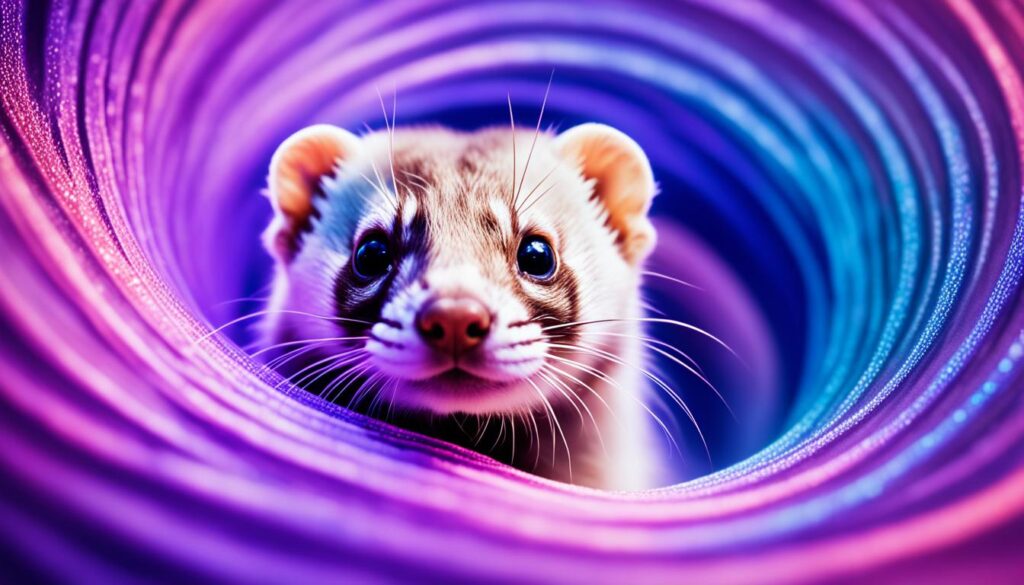
Image: An illustration representing the spectrum of light, including ultraviolet light. Ferrets’ unique ability to see in ultraviolet light allows them to perceive colors and patterns invisible to the human eye.
The Significance of Ultraviolet Vision in Animal Behavior
Ultraviolet (UV) vision plays a significant role in shaping animal behavior and interactions with their environment. This unique ability allows animals to perceive UV patterns that are invisible to the human eye, unlocking a hidden world of visual cues and signals.
One fascinating example of UV vision is found in the relationship between plants and insects. Some flowers have intricate UV patterns on their petals, acting as guides that lead insects to nectar-rich areas. This natural mechanism assists in pollination, ensuring the transfer of pollen between flowers and the continuation of plant species.

Additionally, certain plants have evolved UV patterns that act as traps to capture UV-sensitive prey, such as insects. These UV patterns highlight specific areas of the plant where prey is likely to be found, allowing predator animals to identify and target their food sources with greater precision.
“UV patterns on petals serve as guides for insects to locate nectar-rich areas and act as traps for UV-sensitive prey.”
In the realm of predator-prey interactions, UV vision takes on another critical role. Some animals, like birds, reptiles, and mammals, possess UV vision and are capable of detecting and tracking UV-reflective prey. The ability to perceive UV patterns on potential prey provides these animals with an advantage in hunting and capturing their targeted food sources.
The UV vision abilities in animals extend beyond plants and prey detection. In the case of ferrets, their ability to see in UV light may assist them in foraging behavior. By perceiving UV patterns on plants, ferrets can potentially locate food sources or identify areas where other animals have marked their territories.
To summarize, UV vision in animals has significant implications for various aspects of animal behavior, including plant-pollinator relationships, predator-prey interactions, and foraging behavior. By peering into the UV spectrum, animals gain access to a world of hidden visual cues, allowing them to navigate their environment, locate resources, and interact with their surroundings in ways that are invisible to us.
The Significance of Ultraviolet Vision in Animal Behavior: Examples
| Animal Behavior | Example |
|---|---|
| Plant-pollinator interactions | UV patterns on petals leading insects to nectar |
| Predator-prey interactions | UV vision aiding in prey detection and tracking |
| Foraging behavior | UV patterns on plants assisting in food source detection |
Comparing Ferrets’ Vision to Other Animals
Ferrets share some visual adaptations with other nocturnal animals, such as cats and owls. They all possess a tapetum lucidum, which enhances their night vision. However, the extent of their night vision capabilities can vary among species. Some animals, like certain rodents and bats, have the ability to see in ultraviolet light, similar to ferrets. However, the specifics of their visual adaptations and the full range of their night vision abilities may differ. Further research is needed to fully understand the similarities and differences in visual adaptations among nocturnal animals.
Comparative Visual Adaptations in Nocturnal Animals
| Animal | Tapetum Lucidum | Ability to See in Ultraviolet Light |
|---|---|---|
| Ferrets | Present | Yes |
| Cats | Present | No |
| Owls | Present | No |
| Rodents | Present | Yes |
| Bats | Present | Yes |
As shown in the table, ferrets, cats, and owls all possess a tapetum lucidum, which allows them to maximize available light for improved night vision. However, ferrets have the unique ability to see in ultraviolet light, along with certain rodents and bats. The presence of ultraviolet vision in these animals suggests an evolutionarily advantageous adaptation that provides additional visual information for specific behaviors.
Further research into the visual adaptations of nocturnal animals is necessary to fully understand the complexities of their night vision and the role of ultraviolet light perception in their behavior.
While ferrets, cats, owls, rodents, and bats share some visual similarities in terms of the tapetum lucidum, the full range and intricacies of their night vision capabilities are still being explored. The comparative examination of visual adaptations among nocturnal animals offers valuable insights into the diversity of strategies employed by different species to thrive in low light environments.
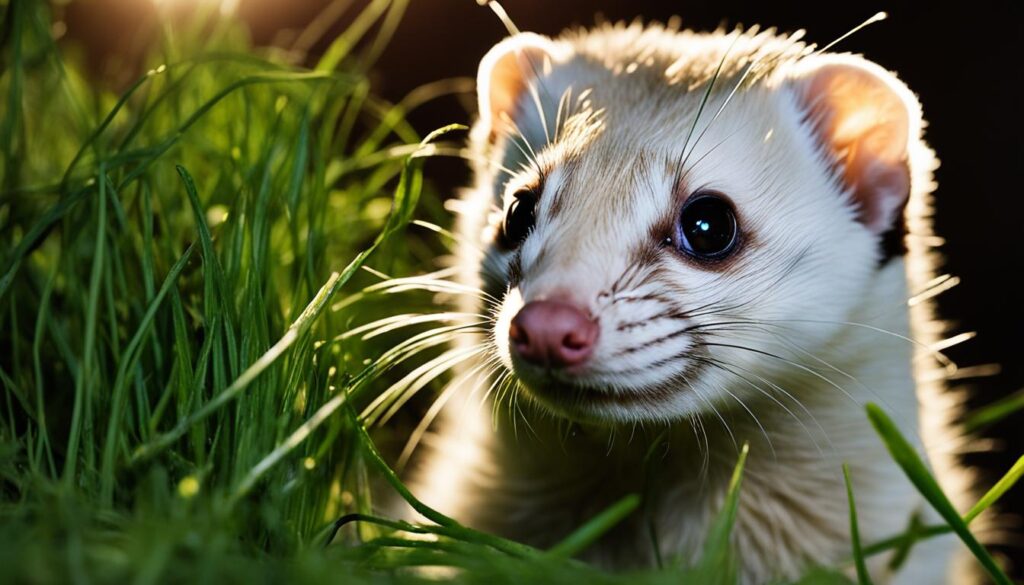
The Evolutionary Implications of Night Vision in Ferrets
One of the most fascinating aspects of ferrets’ night vision is its evolutionary significance. The ability to see in low light conditions provides ferrets and other nocturnal animals with distinct advantages for survival and hunting. Through the process of natural selection, individuals with enhanced night vision have been favored, enabling them to pass on their superior visual adaptations to future generations.
Animals with superior night vision possess a greater ability to detect prey, navigate their environment, and avoid predators. This heightened visual acuity in dimly lit environments increases their chances of successful hunting and enhances their overall survival rates. Over time, the ferret species has developed and refined specialized visual systems that excel in navigating and thriving in the darkness.

By adapting to low light conditions, ferrets have unlocked new possibilities for survival and hunting. The ability to perceive their surroundings in the dark gives them a distinct advantage over their prey, allowing them to stealthily approach and capture their targets. This evolutionary adaptation has shaped the behavior and physiology of ferrets, enabling them to excel in their nocturnal lifestyle.
In addition to facilitating hunting success, night vision in ferrets also aids in avoiding predators. Their enhanced ability to see in the dark enables them to detect potential threats and take evasive action before they are detected. This heightened awareness provides them with a crucial edge in surviving encounters with larger predators.
Ferrets’ night vision is a remarkable example of the power of natural selection. Through countless generations, those individuals with superior night vision have been favored, leading to the development of specialized visual adaptations that contribute to their survival and hunting success.
The evolutionary implications of night vision in ferrets extend beyond their own species. The survival advantages provided by enhanced night vision have likely influenced the evolution and behavior of other nocturnal animals, leading to the development of diverse visual adaptations across the animal kingdom.
Comparing Night Vision Adaptations
When comparing the night vision adaptations of different species, we can observe both similarities and differences. It is not only ferrets that possess enhanced night vision; other nocturnal animals, such as cats and owls, also exhibit specialized visual adaptations. However, the specific mechanisms and capabilities of night vision can vary among these species.
Some animals, like certain rodents and bats, share with ferrets the ability to see in ultraviolet light. This adaptation provides them with additional sensory information and potential advantages in their nocturnal activities. However, while similar in their ability to see in low light conditions, the specifics of their visual adaptations may differ.
| Species | Night Vision Advantage |
|---|---|
| Ferrets | Enhanced ability to navigate, hunt, and avoid predators in the dark |
| Other Nocturnal Animals | Diverse adaptations based on species, such as specific visual structures or heightened sensitivity to light |
Understanding the evolutionary implications of night vision in ferrets not only provides insights into their fascinating abilities but also deepens our appreciation for the complex processes that shape life on Earth. The study of night vision adaptations illuminates the diversity and ingenuity of nature’s solutions to the challenges posed by low light conditions.
The Importance of Understanding Ferrets’ Night Vision
Understanding ferrets’ night vision has practical implications for ferret owners. Providing appropriate lighting conditions in their environment is crucial to meet their visual needs. While ferrets have excellent night vision, they still require some light to see. Ensuring that their living spaces are adequately illuminated can help prevent accidents and facilitate their overall wellbeing.
Recognizing their visual abilities also allows owners to engage in enriching activities and toys that tap into their natural hunting instincts, promoting their overall physical and mental health. By understanding the unique visual adaptations of ferrets in low light conditions, we can provide an environment that supports their natural behaviors and enhances their quality of life.
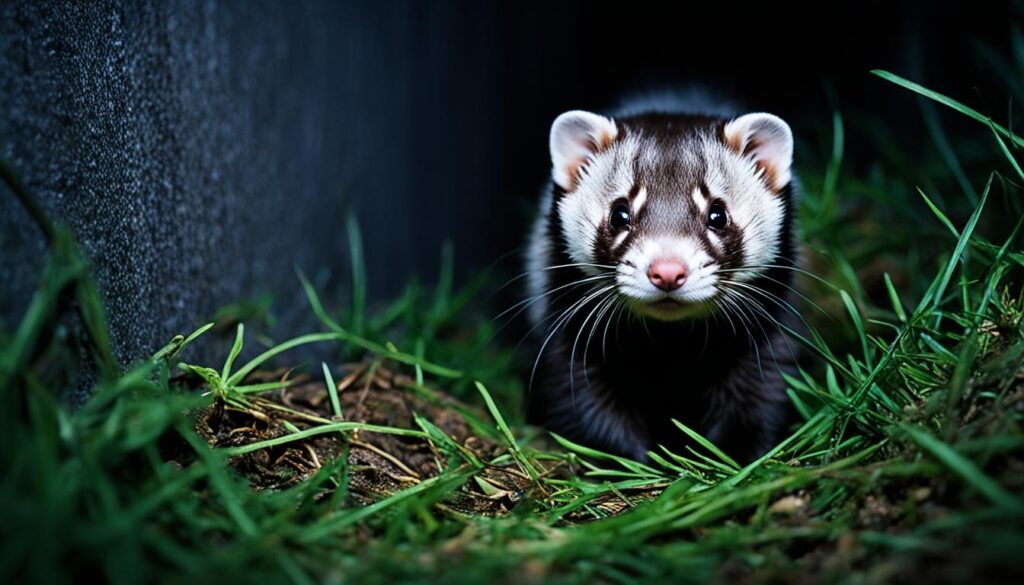
The Role of Lighting
“Proper lighting is essential for ferrets to navigate their surroundings and interact with their environment. By mimicking natural lighting conditions, we can help them feel more secure and confident in their surroundings.”
The proper lighting conditions are vital because ferrets rely on visual cues to navigate their surroundings, locate food, and interact with their environment. By providing appropriate lighting, we can create a safe and stimulating environment for our furry friends. Natural lighting conditions, such as daylight or soft artificial light, help maintain their natural circadian rhythms and ensure they feel secure in their surroundings.
Ferrets are curious animals with a strong inclination for exploring and hunting. By recognizing their visual abilities, we can introduce enriching activities and toys that encourage their natural instincts. Toys that incorporate movement, textures, and visual stimuli can engage their ferret hunting behaviors and keep them mentally and physically stimulated.
Preventing Accidents
“A well-lit environment helps prevent accidents and injuries that can occur when ferrets navigate their environment in low-light conditions. Providing a well-lit living space ensures their safety and minimizes the risk of trips, falls, and collisions with objects.”
Ferrets are agile creatures, but accidents can happen, especially when they are in dimly lit areas. Adequate lighting helps prevent trips, falls, and collisions, reducing the risk of injuries. Well-lit living spaces allow ferrets to navigate with confidence and actively explore their surroundings without the risk of accidents.
Ensuring appropriate illumination in their cages, play areas, and even during playtime outside their enclosures is essential for maintaining their safety. By providing a well-lit environment, we create a space where our furry friends can thrive and enjoy their daily activities.
Recognizing Their Visual Abilities
“Understanding ferrets’ visual abilities helps us appreciate their unique perspective of the world. By recognizing their unique visual adaptations, we can tailor their environment and activities to suit their natural behaviors and enhance their overall wellbeing.”
Recognizing that ferrets have excellent night vision and the ability to detect minimal amounts of light allows us to understand how they perceive their environment. Their unique visual adaptations, such as the tapetum lucidum, enhance their ability to see in low light conditions and play a vital role in their natural hunting instincts.
By recognizing their visual abilities, we can create an environment that supports their natural behaviors and promotes their overall wellbeing. Providing toys and activities that stimulate their hunting instincts and engage their visual senses can keep them mentally and physically active. Understanding their night vision capabilities allows us to provide an environment that enhances their quality of life and ensures their needs are met.
In Summary
Understanding ferrets’ night vision and the implications it has for owners is essential for their overall wellbeing. Providing appropriate lighting conditions, recognizing their unique visual abilities, and tailoring their environment to suit their natural behaviors are crucial aspects of responsible ferret ownership.
By acknowledging and respecting ferrets’ exceptional night vision, we can ensure a safe, stimulating, and enriching environment that supports their natural instincts and promotes their overall health. Through this understanding, we can form a deeper bond with our furry companions and provide them with the care they need to thrive.
Ferrets and Other Nocturnal Animals’ Visual Abilities
Ferrets’ night vision capabilities are just a small part of the overall diversity of visual adaptations seen in nocturnal animals. While some animals, like cats, have similar visual adaptations to ferrets, others, such as owls, possess specialized adaptations like enlarged eyes and extra rod cells for heightened light sensitivity. Each species has evolved unique visual strategies to excel in their specific nocturnal niches. Exploring and understanding the range of visual adaptations in nocturnal animals provides valuable insights into the complex and fascinating world of nighttime wildlife.
Comparing Visual Adaptations
Let’s take a closer look at the visual adaptations of different nocturnal animals:
| Animal | Visual Adaptations |
|---|---|
| Ferrets | The tapetum lucidum enhances their vision in low light conditions. |
| Cats | They also have a tapetum lucidum and excellent night vision. |
| Owls | Enlarged eyes and extra rod cells provide heightened light sensitivity. |
These examples showcase the diversity of visual adaptations in nocturnal animals. While some species share common features, such as the tapetum lucidum, others have unique adaptations that allow them to thrive in their specific nocturnal habitats.
“Each species has evolved unique visual strategies to excel in their specific nocturnal niches.”
Unveiling Nighttime Wonders
Exploring the different visual adaptations in nocturnal animals is like uncovering a hidden realm filled with wonder. Each species has developed specialized abilities that enable them to perceive and interact with their environment in ways we can only imagine. From the tapetum lucidum in ferrets and cats to the enlarged eyes of owls, these adaptations are a testament to the fascinating diversity of life on Earth.
Understanding the visual capabilities of nocturnal animals not only deepens our appreciation for their unique adaptations but also sheds light on the complex interactions that shape their behavior. By delving into this realm of nighttime wildlife, we uncover a world unimaginable to us during our own diurnal experiences.

Whether it’s the tapetum lucidum reflecting light in the eyes of a ferret, the acute night vision of a cat, or the extraordinary visual sensitivity of an owl, each adaptation tells a story of how these creatures have honed their senses to navigate the darkness and thrive in their nocturnal domain.
As we continue to explore and appreciate the diversity of night vision capabilities in nocturnal animals, we gain a greater understanding of the intricate web of life and the remarkable adaptations that underpin its existence.
The Fascinating World of Nocturnal Vision
Nocturnal vision in the animal kingdom is a captivating and enigmatic domain. The ability of animals to see in the dark and perceive ultraviolet light reveals a hidden world that remains largely invisible to us humans. While we may never fully comprehend the true experience of night vision, the study of animal vision continues to unveil the remarkable adaptations and perceptions that shape their behavior and interactions.
Appreciating and acknowledging the intricacies of nocturnal vision enriches our understanding of the diversity and complexity of life on Earth.
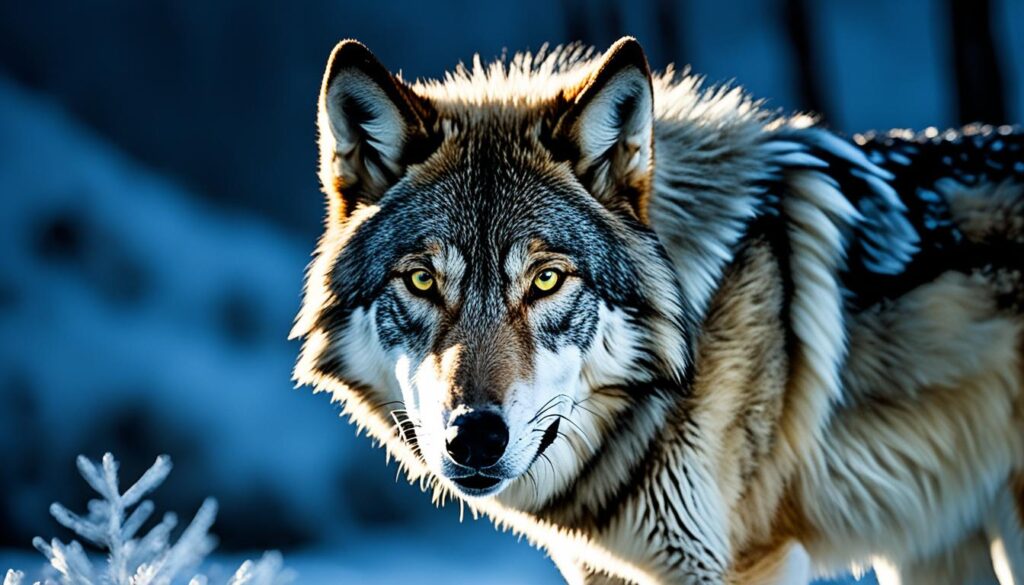
Conclusion
In conclusion, ferrets possess remarkable night vision capabilities, allowing them to navigate and hunt in low light conditions. Their visual adaptations, including the tapetum lucidum and the ability to see in ultraviolet light, contribute to their unique visual abilities.
The presence of ultraviolet vision in ferrets and other mammals holds significant implications for animal behavior. Although more research is needed to fully understand its role, the ability to perceive UV light opens up a hidden world of colors and patterns that is invisible to the human eye.
By appreciating the fascinating world of nocturnal vision, we not only gain insight into the extraordinary abilities of animals like ferrets but also deepen our understanding of the intricate and diverse ways in which life perceives and interacts with the world around us. The study of ferrets’ night vision and the significance of ultraviolet vision not only sheds light on their behavior but also reveals the depth and complexity of the natural world.
